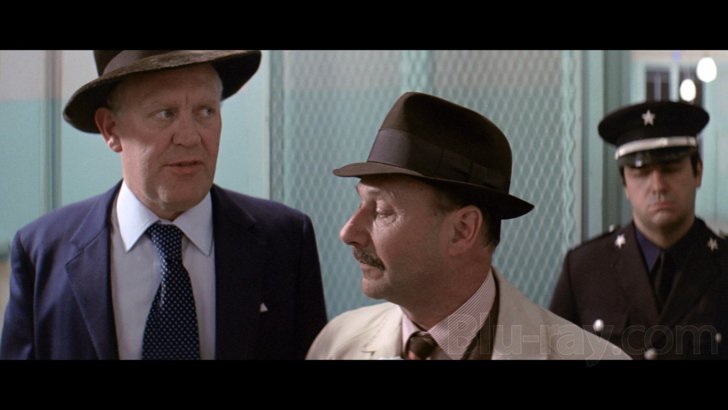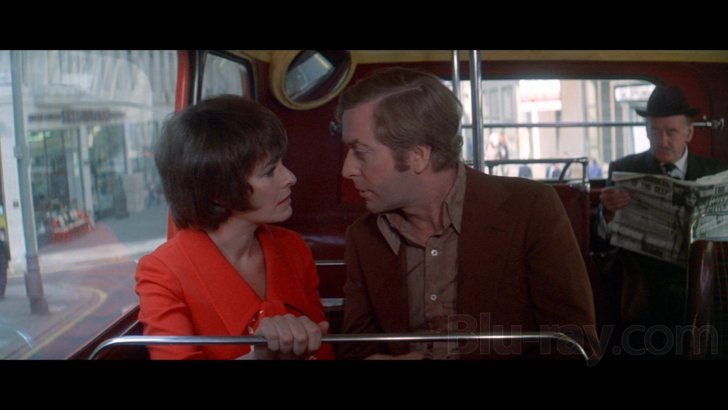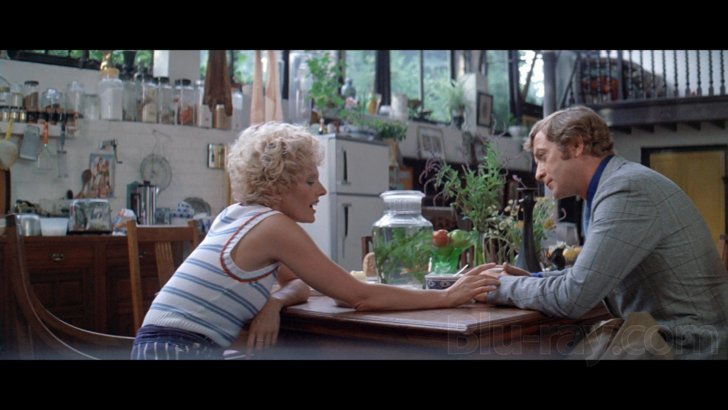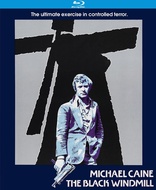The Black Windmill Blu-ray Movie
HomeThe Black Windmill Blu-ray Movie 
Special EditionKino Lorber | 1974 | 106 min | Rated PG | Dec 04, 2018
Movie rating
6.3 | / 10 |
Blu-ray rating
| Users | 4.0 | |
| Reviewer | 3.5 | |
| Overall | 3.5 |
Overview
The Black Windmill (1974)
A British agent's son is kidnapped and held for a ransom of diamonds. The agent finds out that he can't even count on the people he thought were on his side to help him, so he decides to track down the kidnappers himself.
Starring: Michael Caine, Donald Pleasence, Joseph O'Conor, John Vernon (I), Janet SuzmanDirector: Don Siegel
| Thriller | Uncertain |
| Crime | Uncertain |
| Action | Uncertain |
Specifications
Video
Video codec: MPEG-4 AVC
Video resolution: 1080p
Aspect ratio: 2.35:1
Original aspect ratio: 2.39:1
Audio
English: DTS-HD Master Audio 2.0 (48kHz, 16-bit)
Subtitles
English SDH
Discs
Blu-ray Disc
Single disc (1 BD)
Playback
Region A (locked)
Review
Rating summary
| Movie | 3.0 | |
| Video | 4.0 | |
| Audio | 4.5 | |
| Extras | 3.5 | |
| Overall | 3.5 |
The Black Windmill Blu-ray Movie Review
Reviewed by Dr. Svet Atanasov March 4, 2019Don Siegel's "The Black Windmill" (1974) arrives on Blu-ray courtesy of Kino Lorber. The supplemental features on the disc include vintage promotional materials for the film; audio commentary by film historian Mike Siegel; video interview with cinematographer Ousama Rawi; and more. In English, with optional English SDH subtitles for the main feature. Region-A "locked".

The target
Something isn’t right but it is not immediately clear what it is. And this is one of those ‘70s thrillers that has so much going in it that you will feel that if you blink you are likely to miss a crucial detail, which is why it takes some time to unerstand its weakness.
John Tarrant (Michael Caine) is a former military guy who has become an MI6 agent. When someone kidnaps his son, Tarrant immediately informs his superior, Cedric Harper (Donald Pleasence), but does not panic. Shortly after, the kidnappers make contact and describe the conditions under which Tarrant will be able to reunite with his son: he has to transfer to them the uncut diamonds that MI6 has recently acquired as part of a complex investigation targeting a group of arms smugglers working with the IRA in Northern Ireland. The fact that the kidnappers have detailed knowledge of the acquisition and the value of the diamonds immediately lead Tarrant to speculate that they could be working with an insider, which is why he leaves it Harper to figure out a pragmatic solution. However, after a series of quick discussions with other high-ranking officials, Harper informs him that the diamonds cannot be used as ransom and therefore they will have to figure out an alternative strategy that would convince the kidnappers to release his son. The new development pushes Tarrant’s wife (Janet Suzman) on the verge of a nervous breakdown and convinces him that it is time to begin improvising. Shortly after, Tarrant pulls off an old-fashioned con job and steals the diamonds from one of the city’s most prestigious banks, and then heads to Paris to deliver them to the kidnappers and get his son. But in the French capital a lot goes terribly wrong and some of his colleagues at MI6, including Harper, begin speculating that he may actually be working with the kidnappers.
A Don Siegel thriller from the ‘70s with a cast that in addition to Caine, Pleasence, and Suzman includes John Vernon, Delphine Seyrig, and Joss Ackland has to be compared to Dirty Harry and Charley Varrick. Well, it is a very easy comparison to make -- The Black Windmill quite simply isn’t as good as these iconic films.
So, what is wrong with The Black Windmill?
As odd as it may sound, the most obvious issue is Caine’s mismanagement, which has a rather dramatic negative effect on the manner in which the film builds its atmosphere and then goes through different cycles to reach its resolution. Indeed, right from the get-go it feels like Caine is contained and has to react in very particular ways that make his character and his predicament look quite superficial. Unsurprisingly, when the action shifts from one location to another it creates the impression that it does so because it follows a pre-approved path, not because Caine is engaged with his opponents and there are important developments between them that produce the movement. (For reference, exactly the opposite happens in Dirty Harry and Charley Varrick, which is precisely why they appear so loose and are full of terrific surprises).
There are some obvious plot holes that hurt the legitimacy of the conspiracy that is at the core of the film as well. Strangely, the film does not appear at all concerned with their presence, and instead routinely allows light jokes to even further erode its credibility. (Neither the Sean Connery joke nor the naked photo joke actually feel in sync with the tense atmosphere).
As it is usually the case with a lot of other similarly themed films from the same era, there is plenty of outdoor footage that is very attractive. When Caine and Suzman meet in the heart of the city and then get on the bus, there are some wonderful panoramic vistas. Also, later in the film there are some lovely shots of the Jack and Jill windmills in Clayton, West Sussex.
The film benefits from an excellent soundtrack with some subtle but terrifically orchestrated music themes that was composed by Roy Budd (Get Carter).
The Black Windmill Blu-ray Movie, Video Quality 

Presented in an aspect ratio of 2.35:1, encoded with MPEG-4 AVC and granted a 1080p transfer, Don Siegel's The Black Windmill arrives on Blu-ray courtesy of Kino Lorber.
The remaster that was used to produce this release is very nice. It is not the end product of some elaborate restoration, but it is completely free of the harsh digital anomalies that usually plague remasters that emerge from Universal's vaults. (The back cover of the release displays Universal's logo, so I assume that it is where it came from). Unsurprisingly, the film has a very attractive healthy appearance, which at times actually boasts some unusually strong organic qualities. For example, clarity ranges from very good to excellent, and fluidity is equally pleasing. I also like the depth, though there are a few areas, mostly with indoor/darker footage, where there is room for meaningful improvements. There are plenty of wonderful nuances and folks with larger screens will also appreciate the strong density levels. Color balance is very good. Saturation could be a bit better, but it is already very good. A few tiny blemishes can be spotted, but there are no large marks, cuts, or torn frames to report. My score is 4.25/5.00. (Note: This is a Region-A "locked" Blu-ray release. Therefore, you must have a native Region-A or Region-Free player in order to access its content).
The Black Windmill Blu-ray Movie, Audio Quality 

There is only one standard audio track on this Blu-ray release: English DTS-HD Master Audio 2.0. Optional English SDH subtitles are provided for the main feature. When turned on, they appear inside the image frame.
The lossless track is very nice. The film benefits from a wonderful soundtrack with plenty of subtle but very nicely orchestrated music themes and the the quality of the lossless track is quite easy to appreciate. There was one sequence where I felt that there was some unevenness that may not be organic, but the rest sounds great.
The Black Windmill Blu-ray Movie, Special Features and Extras 

- Trailer - a vintage trailer for The Black Windmill. In English, not subtitled. (3 min, 480/60i).
- Image Gallery - a large animated image gallery with various vintage promotional and production materials for The Black Windmill. Without sound. (11 min, 1080p).
- Interview with Cinematographer Ousama Rawi - in this video interview, cinematographer Ousama Rawi recalls how he was approached and offered to work with Don Siegel on The Black Windmill and discusses his interactions with the famous director as well as different phases of the production process. There are also some particularly interesting comments about Donald Pleasence and his personality and working methods. In English, not subtitled. (19 min, 1080p).
- Radio Spots - six vintage radio spots for The Black Windmill. In English, not subtitled. (11 min, 1080p).
- Audio Commentary - in this audio commentary, filmmaker and historian Mike Siegel (Passion and Poetry: The Ballad of Sam Peckinpah) spends a great deal of time discussing Don Siegel's career and style, his connection to Sam Peckinpah, The Black Windmill and some of the film's strengths and weaknesses, etc. It is a good commentary that is very much worth listening to in its entirety because it actually has plenty of information about genre films from the '70s.
- Reversible Cover - reversible cover with vintage poster art.
- Trailer Reel - a collection of trailers for other titles from Kino Lorber's catalog.
The Black Windmill Blu-ray Movie, Overall Score and Recommendation 

The fate of The Black Windmill was determined a long time ago because it really is impossible not to compare it to Dirty Harry and Charley Varrick, and both of these films are so much better it is too obvious that with Don Siegel behind the camera and Michael Caine in front of it, the end product should have been a lot more convincing. I did not dislike The Black Windmill, but I knew exactly where it was heading and how it would get there, and the only thing that kept my attention was the period atmosphere and Roy Budd's score. All in all, I'd say that it is an average film at best, which will probably appeal only to a particular group of folks that have a soft spot for these types of period thrillers as well as Siegel and Caine completists. Kino Video's Blu-ray release is sourced from a very nice remaster and also comes with a pretty interesting commentary recorded by Mike Siegel. RECOMMENDED.
Similar titles
Similar titles you might also like

The Transporter Refueled
2015

Pioneer
Pionér
2013

Shock Wave
拆彈專家 / Caak daan jyun ga
2017

The Prey
La proie
2011

Point Blank
À bout portant
2010

The Street Fighter
Gekitotsu! Satsujin ken / 激突!殺人拳
1974

Taken
2-Disc Extended Cut
2008

Topaz 4K
1969

The Professional
Le professionnel
1981

Machete
2010

Let the Corpses Tan
Laissez bronzer les cadavres
2017

The Suspect
2013

Patriot Games 4K
30th Anniversary Edition
1992

The Killer Elite
Special Edition
1975

Last Embrace 4K
Standard Edition
1979

Cold Blood
2019

Mr. Majestyk
2K Remaster
1974

Coffy
1973

Cold Sweat
De la part des copains
1970

Foxy Brown
1974
